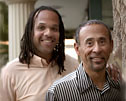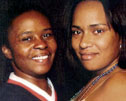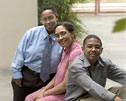Legal marriage for same-sex couples became available on January 1, 2013.
In 2012, the state’s Democratic representatives, led by Governor Martin O’Malley, began a campaign for same-sex marriage legalization. After much debate, a law permitting same-sex marriage was passed by the General Assembly (Maryland’s bicameral legislature of Senate and House of Delegates) in February 2012, and signed on March 1, 2012. The law took effect on January 1, 2013 after 52.4 percent of voters approved a statewide referendum held on November 6, 2012. The vote was hailed as a watershed moment by gay rights activists and marked the first time marriage rights in the United States have been extended to same-sex couples by popular vote.
|
Marriage Rationale History Articles from a Political Leader Regulations & Links to Official State Instructions Further Resources |
Marriage Rationale
Allowing committed same-sex couples to get married does not change the meaning of marriage. It changes who has access.
Civil marriage for same-sex couples does not affect religious marriages, religious institutions or clergy in any way. No legal marriage law has ever required any religion to be forced to marry same-sex couples, or recognize same-sex marriages within the context of their religious beliefs.
What defines a marriage is love and commitment, and the ability to protect your family. Marriage strengthens all families. It gives couples the tools and the security to build a life together and to protect their family.
Couples marry because they want to be together through sickness and health, when times are good and when things get tough. State and federal marriage laws provide a safety net of legal and economic protections for married couples and their children – including the ability to visit a spouse in the hospital, and to transfer property, which can mean being able to remain in the family home when a spouse has passed away.
While there have been attempts to create marriage-like relationship systems — Domestic Partnership registrations and Civil Unions — they don’t provide the same security and protections on a national level.
History
Early in the 1970s, the General Assembly passed the law a short time after voters in the state ratified Article 46 of the Maryland Declaration of Rights, commonly referred to as the Equal Rights Amendment, in November 1972. The constitutional provision prohibited discrimination in equality of rights on the basis of sex.
In 1973, Maryland became the first state in the United States to define marriage as “a union between a man and a woman,” expressly banning same-sex marriage. This law was in direct contradiction to the Equal Rights Amendment.
In 1975, the Maryland Attorney General’s office ruled that the Montgomery County Clerk had no legal basis on which to challenge the validity of the marriage of two women, Michele Bernadette Bush and Paulette Camille Hill, to whom the clerk’s office had issued a marriage license. However, the license was later revoked.
During the 1990s, attempts to ban same-sex marriage did not pass through the legislature.
In 1997, 1998, and 2000, pro-marriage equality bills were also attempted.
Roman Catholic authorities throughout the state were adamantly opposed to the legalization of same-sex marriage, saying it “deeply conflicted” with the “best interests of society” and “would threaten religious liberty.” The debates produced disputes between individuals who had been traditionally aligned on causes and prompted sharp criticism from African-American religious leaders who said same-sex marriage would “disrupt the fabric of the culture.”
After a Maryland House of Delegates committee voted in March 2004 to reject a pair of marriage bills that would have submitted a constitutional amendment against same-sex marriage to voters, and invalidated same-sex marriages performed in another state or foreign country, the American Civil Liberties Union (ACLU) and Equality Maryland filed a lawsuit, Deane & Polyak v. Conaway, to challenge the existing law on behalf of nine same-sex couples, and one bereaved man, whose partner had died.
| The Deane & Polyak v. Conaway Couples | |

|
Gita Deane, 42, and Lisa Polyak, 43 Together since 1981. They are raising five- and eight-year-old daughters. |

|
Alvin Williams, 49, and Nigel Simon, 35 Together since 1998. They are raising their six-year-old son, and plan to adopt eight- and six-year-old siblings. |

|
Takia Foskey, 29, and Jo Rabb, 37 Together since 2003. They are raising an 11-year-old daughter and a six-year-old son. |

|
Jodi Kelber-Kaye, 40, and Stacey Kargman-Kaye, 36 Together since 1993. They are raising six- and one-year-old sons. |

|
Donna Myers, 29, and Maria Barquero, 35 Together since 1999. |

|
John Lestitian, 38 Had been with his deceased partner, Jim, 33, for 12 years. |

|
Charles Blackburn, 71, and Glen Dehn, 66 Together since 1979. |

|
Steve Palmer, 32, and Ryan Killough, 30 Together since 1998. |

|
Patrick Wojahn, 28, and Dave Kolesar, 26 Together since 2000. Patrick: “Without a marriage license, there is no absolute peace of mind for my partner and myself. We have natural fears about being left out in the cold, should Dave fall ill again. I know that there are thousands of Maryland couples, just like us, who seek legal marriage to make caring for our families far less complicated and uncertain than it is now, as virtual strangers under the law.” |

|
Mikki Mozelle, 28, Lisa Kebreau, 36, and son, 14 Together since 2002. They are raising their 14-year-old son, and expected a boy in October 2004. |
The lead plaintiffs, from whom the case received its name, were Gita Deane, a learning specialist at Goucher College, and her partner Lisa Polyak, an environmental engineer for the U.S. Army Medical Department. The plaintiffs had applied for marriage licenses in several different Maryland counties but were denied by court officials. In their complaint, the plaintiffs argued that the state’s statutory ban on same-sex marriage violated constitutional protections of due process, equality, and prohibitions against sex discrimination in Articles 24 and 46 of the Maryland Declaration of Rights.
In January 2006, Baltimore Circuit Court Judge M. Brooke Murdock granted summary judgment to the plaintiffs, writing that “Family law §2-201 violates Article 46 of the Maryland Declaration of Rights because it discriminates, based on gender against a suspect class, and is not narrowly tailored to serve any compelling governmental interests.” She added that “tradition and social values alone cannot support adequately a discriminatory statutory classification,” because “when tradition is the guise under which prejudice or animosity hides, it is not a legitimate state interest.” The judge immediately stayed the decision pending an appeal by the Attorney General of Maryland, which occurred later that day.
This court decision was favored by the plaintiffs, gay rights groups and their supporters—including more than 100 religious leaders and child welfare advocates across the state, who filed amicus briefs. Other local religious leaders and evangelical ministers were upset by the decision and looked to state legislators to propose a constitutional ban on same-sex marriage. Such an amendment was favored by then-Governor Robert Erlich who said “My politics on this are very clear. We’re going to protect marriage. Traditional marriage.”
In February 2006, the proposed ban was rejected after opponents successfully amended it to legalize civil unions.
Consequently, Delegate Don Dwyer introduced a resolution to impeach Judge Murdock in 2006, alleging “misbehavior in office, [willful] neglect of duty, and incompetency” for her trial court decision. In 2007, he introduced a law that would ban discussion of same-sex unions in public schools.
One lawmaker said “It is a clear attempt to intimidate judges and to make the judiciary subservient to the legislature,” and Michael Conroy, former President of the Maryland State Bar Association, said that “No basis in fact or law exists to support any suggestion to impeach Murdock for her recent decision on same-sex marriage.” David Rocah, an attorney for the ACLU, called the resolution “a frivolous, dangerous and extremist response from the lunatic fringe.” Both of the measures failed to pass through committee.
In 2007, the court upheld the statutory ban on same-sex marriage as being constitutional, in Conaway v. Deane.
In 2010, the state recognized same-sex marriages performed in other jurisdictions following the legal opinion from Attorney General Doug Gansler in his nine-month analysis of comity laws.
Jessica Port and Virginia Anne Cowan met in Maryland, then married in San Francisco, California in 2008. Unfortunately, they separated and sought a divorce. In July 2010, after they had been separated a year, Virginia Cowan filed a petition for divorce. The trial court found that, although Port and Cowan met all the requirements for divorce under Maryland law, and both wished to divorce, it would not grant a divorce because, according to the court, it would be against “public policy” to do so. In April 2012, the National Center for Lesbian Rights, on behalf of Jessica Port, and Lambda Legal, on behalf of Virginia Cowan, argued their case before the Maryland Court of Appeals.
On May 18, 2012, the Maryland Court of Appeals maintained Attorney General Gansler’s 2010 analysis and issued a unanimous decision (7-0) in Port v. Cowan finding that a same-sex marriage performed out-of-state must be considered equal and valid under state law. They ruled that, under longstanding Maryland law, out-of-state marriages of same-sex couples must receive legal respect and treated like any other marriage, regardless of whether same-sex couples are allowed to marry in Maryland. The court also discussed the many ways in which the state government already recognized these marriages.
[see the Port v. Cowan divorce finding (PDF)]
Later in 2012, the state’s Democratic representatives, led by Governor Martin O’Malley, began a campaign for same-sex marriage legalization. After much debate, a law permitting same-sex marriage was passed by the General Assembly (Maryland’s bicameral legislature of Senate and House of Delegates) in February 2012, and signed on March 1, 2012.
On January 1, 2013, the law took effect, after 52.4 percent of voters approved a statewide referendum held on November 6, 2012. The vote was hailed as a watershed moment by gay rights activists and marked the first time marriage rights in the United States have been extended to same-sex couples by popular vote.
Articles from a Political Leader
|
I want to thank all of you for being here this morning. There is a broad coalition, many of whose members are arrayed on the steps here with me. They are all supportive of the bill that was introduced last night on civil marriage equality in the State of Maryland. All of us want the same thing for our children. Marylanders of different religious beliefs, Marylanders of all walks of life all want the same thing for our children. We want our children to live in loving, stable, committed households that are protected equally under the law. We also believe that we can protect religious freedom and rights equally under the law. Other states have found a way to do this. We can find a way to do this too. And that common ground that allows us to move us forward is dignity – the human dignity of every single person. This is a broad coalition that is supportive of this bill, including Marylanders for Marriage Equality coalition, which now includes the Baltimore NAACP, the ACLU, the Human Rights Campaign, the National Black Justice Coalition, the National Gay and Lesbian Task Force [After October 2014, known as the National LGBTQ Task Force.], the Family Equality Council, Catholics for Equality, the Jewish Community Relations Council of Greater Washington, Maryland Faith for Equality, the Unitarian Universalist Legislative Ministry of Maryland, PFLAG, NOW, Progressive Maryland, and Equality Maryland, and many others. Yesterday, we submitted a marriage equality bill which balances equal protection of individual rights with the important protection of religious liberty and religious freedom. This is a broad- based array of Marylanders that support this bill. Just this month, we also welcomed the support of the AFL-CIO and SEIU 1199, one of, I think, the largest health care unions in the entire country. The momentum is growing, and there’s a lot of hard work to do. We are going to be successful in this legislative session by recognizing the dignity in one another, by recognizing the common humanity that all of us share. In this great State, that celebrates diversity as our strength, we choose to be bound together by a common thread. That common thread is human dignity. It’s what allows us to look into the eyes of every child in our State, and say that this child is a child of God, and that this child is worthy of the protection of the laws equally, that all of us come together to support in order to make our State a better place, a more just place, a more caring place. |
|
Testimony on Marriage Equality Governor Martin O’Malley before the Joint Hearing of House Health and Government Operations & House Judiciary Committees February 10th, 2012, Annapolis, MD There are certain aspirations that I believe all of us share; certain hopes. One of the most basic is the hope that every child in our State has the opportunity to live in a loving, caring, committed, and stable home, protected equally under the law. Earlier this week, as they ruled on California’s Proposition 8, the Judges of the 9th Circuit Court of Appeals wrote that to treat families differently under the law because they happen to be led by gay or lesbian couples serves to, quote, “lessen the status and human dignity of gays and lesbians, and to officially reclassify their relationships and families as inferior to those of opposite-sex couples.” As I shared with all of you just a few days ago at the State of the State, if there is a common thread running through our efforts together in Maryland – including controversial efforts – it is the thread of human dignity; the dignity of work, the dignity of family, the dignity of faith, the dignity of every individual. It is not right or just that the children of gay couples should have lesser protections than the children of other families in our State. Nor would it be right to force religious institutions to conduct marriages that conflict with their own religious beliefs and teachings. The mystery of human existence; the mystery of our own relationships with one another; mystery of our own individual relationships with the creator of Creation, is a deep, deep mystery. All faiths search for the truth that is at the center of that mystery. This search requires individual freedom. And this search also requires religious freedom. In fact, the very reason for our State’s founding was for religious freedom. And at the heart of religious freedom is respect for the freedom of individual conscience. We are a people of many different religions and many different faiths. The only way forward, in a pluralistic society of diverse faiths such as ours, is to have laws that protect and respect the freedom of all, equally. In New Hampshire, they’ve been able to come together and pass a law that protects individual civil marriage rights and religious freedom equally. In New York, last year, they came together in a bipartisan way to protect each of these freedoms. And in Washington State just this week, they came together to do the same. In all, seven states have passed laws protecting individual civil marriage rights and religious freedom equally. We have the opportunity to do the same thing. Here in Maryland, we already recognize civil marriages performed in other states and just over our border in the District of Columbia. The civil marriage equality bill that you consider today draws upon the lessons we’ve learned from these other states – where none of these measures would have passed were it not for the explicit protections of religious freedom. This bill balances equal protection of individual civil marriage rights with the important protection of religious freedom for all. Because it protects both these unalienable rights, it is supported by a broad coalition of Marylanders, which includes clergy, community leaders, faith-based organizations, civil rights groups, and those who hold that most important of all titles in our State: the title of citizen. Moms and dads from across our State want the same things for their kids: we want them to live in a loving, caring, committed, and stable home protected equally under the law. I urge you to pass the bill before you and allow our State to move forward with protection for religious freedom and protection for the individual freedom of all. |
|
[at the signing ceremony] For a free and diverse people, for a people of many faiths, for a people committed to the principle of religious freedom, the way forward is always to be found through greater respect for the equal rights of all; for the human dignity of all. Religious freedom was the very reason for our State’s founding. At the heart of religious freedom is the freedom of individual conscience. If there is a thread that unites all of our work here together, it is the thread of human dignity; the dignity of work; the dignity of the job, the dignity of every child’s home; the dignity of every individual. We are one Maryland, and all of us, at the end of the day, want the same thing for our children: we want them to live in a loving, caring and committed home that is protected equally under the law. [the signatures are gathered] And the bill is signed. [on the capital steps, following the signing] It was a huge step forward for us as a State. For all of the fear, and all of the division, and all of the arguments back and forth, at the end of the day, human dignity won. We are a diverse people of many faiths, and we found a way, as one Maryland, to protect religious freedom, and the rights of all individuals. That’s really what this victory was all about. |
Regulations & Links to Official State Instructions
Maryland Marriage License Regulations
A marriage license must be obtained from the Circuit Court Clerk’s Office in the county where the marriage is to take place.
Each county has different fees.
- Both parties must be present to apply.
- Marriage license is only good for the county in which you apply for the license.
- Fee varies, depending on County.
- Cash, Check, Visa and Mastercard are acceptable forms of payment.
- A license is not effective until 6am on the second calendar day after the license is issued.
- The license is issued the same day you apply, and it is valid for 6 months, after which the license expires.
- Photo Identifications
- Full names
- Physical, Permanent Addresss
- Ages
- States of Birth
- Social Security Numbers
- If you have ever been married before, you must supple the County, State, Month, Day, and Year for the last divorce, or death, of spouse, with appropriate support documents.
- Whether the parties are related by blood or marriage
- 16 or 17 years old must have the consent of a parent or guardian — parent or guardian must be with the minor at the time of the application — or have a certificate from a licensed physician or physician’s letterhead stating that the physician has examined the women to be married (not just a blood test) and note the date of delivery or expected date of delivery, and it must be signed by the doctor. You also must provide original state birth certificate and photo id.
- 15 years old must have the consent of a parent or guardian — parent or guardian must be with the minor at the time of the application — and have a certificate from a licensed physician on his letterhead stating the physician has examined the woman to be married (not just a blood test) and found that she is pregnant or has given birth; the expected date of delivery or the date child was delivered; and must be signed by him. Original state birth certificate and photo id must also be provided.
- 14 years and younger may not marry.
- $25-30 fee (depending on county), due at the time of the ceremony.
- Cash, Check, Visa and Mastercard are acceptable forms of payment.
- No appointment necessary
- The ceremony will be performed in the Clerk’s Office Ceremony Room.
- Maryland Circuit Courts - a list of county courts
- Marriage License Information
Further Resources
| Governments that offer Full Legal Marriage | ||
|
Nations . Netherlands (2001) Belgium (2003) Canada (2005) Spain (2005) South Africa (2005) Norway (2009) Sweden (2009) Iceland (2010) Argentina (2010) Portugal (2010) Denmark (2012) France (2013) New Zealand (2013) Brazil (2013) Uruguay (2013) New Zealand (2013) United Kingdom (England, Wales) (2013) Luxembourg (2014) Finland (2014) Scotland (2014) Ireland (2015) Greenland (2015) United States (2015) Colombia (2016) Germany (2017) Malta (2017) Australia (2017) Austria (2019) Taiwan (2019) Ecuador (2019) Costa Rica (2020) Chile (2022) Estonia (2023) Nepal (2023) Greece (2024) |
US States . U.S. Supreme Court, June 26, 2015 Ruling: All States must allow legal, same-sex marriage. . These states had legal marriage before the ruling: . Massachusetts (2004) California (2008) Connecticut (2008) Iowa (2009) Vermont (2009) New Hampshire (2009) District of Columbia (2009) New York (2011) Maine (2012) Washington (2012) Maryland (2013) Rhode Island (2013) Delaware (2013) Minnesota (2013) Illinois (2013) Utah (2013) New Jersey (2013) Hawaii (2013) New Mexico (2013) Michigan (2014) - stayed pending legal challenge Oregon (2014) Wisconsin (2014) Arkansas (2014) - stayed pending legal challenge Pennsylvania (2014) Indiana (2014) Nevada (2014) Virginia (2014) Oklahoma (2014) Idaho (2014) West Virginia (2014) Alaska (2014) Arizona (2014) Wyoming (2014) Kansas (2014) - stayed pending legal challenge Florida (2014) Colorado (2014) North Carolina (2014) South Carolina (2014) Montana (2014) Alabama (2015) |
Native American Tribes . Coquille Tribe, Oregon (2009) Mashantucket Pequot Tribe, Connecticut (2010) Suquamish Tribe, Washington (2011) Port Gamble S’Klallam Tribe, Washington (2011) Little Traverse Bay Bands of Odawa Indians, Michigan (2013) Pokagon Band of Potawatomi Indians, Michigan (2013) Santa Ysabel Tribe, California (2013) Confederated Tribes of the Colville Reservation, WA (2013) Cheyenne & Arapaho Tribes, Oklahoma (2013) Leech Lake Band of Ojibwe, Minnesota (2013) Grand Portage Band of Chippewa, Minnesota (2013) Puyallup Tribe of Indians, Washington (2014) Salt River Pima-Maricopa Indian Community, Arizona (2014) Wind River Indian Reservation, Wyoming (2014) Blackfeet Indian Reservation, Montana (2014) San Carlos Apache Tribe, Arizona (2014) Fort McDermitt Paiute & Shoshone Tribes, OR & NV (2014) Fort McDowell Yavapai Community, Arizona (2014) Lac du Flambeau Band of Lake Superior Chippewa, WI (2014) Fond du Lac Band of Lake Superior Chippewa (2014) Keweenaw Bay Indian Community (2014) Pascua Yaqui Tribe (2014) Confederated Tribes of Coos, Lower Umpqua, & Siuslaw Indians (2014) Central Council of Tlingit & Haida Indian Tribes, Alaska (2015) Oneida Nation, Wisconsin (2015) Confederated Tribes of Siletz Indians (2015) Chemehuevi Indian Tribe (2015) Confederated Tribes of Grand Ronde (2015) Sault Ste. Marie Tribe of Chippewa Indians (2015) Stockbridge-Munsee Tribe (2016) Oglala Sioux Tribe (2016) Tulalip Tribe, Washington (2016) Menominee Nation (2016) Cherokee Nation (2016) |